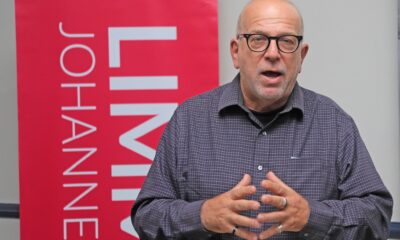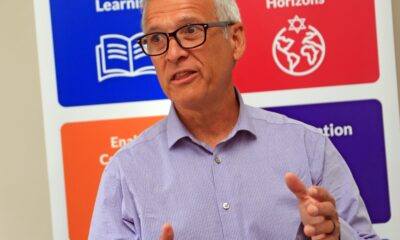
Featured Item

Years of ‘traumatic peacemaking’ and no path ahead
The foundational Israeli experience, the fact that so many Jews came to Israel because they had nowhere else to go, has profound consequences for any strategy employed to destroy the country. That’s according to Haviv Rettig Gur, a veteran Israeli-American journalist and a senior analyst at The Times of Israel, who spoke at Limmud Johannesburg on the weekend of 23 to 25 August.
“Why doesn’t terrorism destroy Israel?” Gur asked. “Why have Israelis not fled Israel in large numbers? Why do we thrive and flourish while constantly being terrorised? It’s because when you murder the children of a people who have nowhere to go, their response will be to stay put and fight. Terrorism hasn’t destroyed Israel, it’s destroyed Palestine,” Gur said.
In looking at Israeli politics, wars, and peace efforts, Gur examined trends in voter turnout – the best measure of trust in the political system. After decades of a more than 80% voter turnout average in Israel, voter turnout fell to 62% in 2001. Ever since, Israeli voters have consistently voted in ways that are totally unpredictable.
In some ways, Israel is considered a prosperous, happy country, said Gur. “But in other ways, in Israel, you’re walking around a post-traumatic society. That trauma goes back to the Second Intifada [which began in 2000].”
The First Intifada began in 1987, when tensions boiled over after 20 years of Israeli military rule over Palestinian cities. “One element of the First Intifada has burned itself into Israeli psyches even if they don’t know it,” said Gur. “This is ‘the children of the stones’, where during the First Intifada, Palestinian kids leaving school would throw rocks at Israeli soldiers on a mass scale.”
Armed to the hilt but helpless in this situation, these soldiers didn’t know what to do. “It was the Palestinian population turning to the Israeli public and asking, ‘What’s your plan’?” Gur said. Ultimately, the plan came in the form of the first Oslo Accords. They provided a framework for Israeli-Palestinian peace and the First Intifada ended in 1993.
“In 1995, Oslo 2 becomes an actual treaty between Israelis and Palestinians,” Gur said. “This commits Israel to pulling out of civilian population centres and to establishing Palestinian autonomy with security. Yet in November 1995, Yitzhak Rabin is assassinated by an Israeli Jew opposed to this peace process.”
Benjamin Netanyahu ultimately won the 1996 elections by an extremely narrow margin, and though he didn’t advance the peace process, he implemented most of what Rabin had agreed to. He was later voted out of office, and Ehud Barak came to power in 1999. “Barak starts negotiating for the establishment of a Palestinian state and for shared sovereignty of the Temple Mount,” said Gur. “And then in 2000, the Second Intifada begins. Over three years, there were 140 suicide bombings targeting Israeli civilians and it shattered the Israeli left for generations to come.”
This is because the intifada upended the left’s popular narrative, Gur said. “The left’s story was that the Palestinians are under occupation, under military rule, and they don’t elect the people who rule them. That’s a moral debt that we owe them – the right not to be under someone else’s military rule. The left therefore makes a promise that if we give the Palestinians their independence, they will give us peace and security.”
Yet with the Second Intifada came the collapse of this promise. While we know the conflict was sparked by Ariel Sharon’s visit to the Al-Aqsa Mosque, the timing was difficult to understand. “The great tragedy of the Second Intifada is that it’s an absolute mystery and it remains one even today – the question of why it happened when the Palestinians were getting everything they wanted,” said Gur. Israelis are convinced Palestinians are just extremists, violent, and committed to our destruction, but there’s more to it than that, he said.
Sharon won the 2001 election, and following the 2002 Passover Massacre, in which a terrorist killed 30 people at a public seder, he launched Operation Defensive Shield, which sought to renew the Israel Defense Forces control of major cities in the West Bank. Highly successful, it brought an end to the bombings and ultimately led to the 2005 Israeli withdrawal from Gaza and an end to the Second Intifada. “This was perceived as a right-wing solution to a problem the left couldn’t figure out,” Gur said.
In 2006, after Sharon’s debilitating stroke, new Prime Minister Ehud Olmert intended to withdraw from the West Bank. Yet that year, Hamas carried out its first tunnel operation, kidnapping Gilad Shalit. This was swiftly followed by Hezbollah’s first cross-border attack six years after Israel pulled out of Lebanon. “Olmert has a problem, two places that Israel pulled out of are now at war with Israel,” said Gur.
You cannot deter a Hezbollah or a Hamas, Gur said. That was the lesson of 2006, and it ultimately led to the construction of the Iron Dome and the Israeli belief that nothing works with the Palestinians. This was how Netanyahu got back into power, by promising to do very little to advance peace or to ignite war, Gur said.
Fast-forwarding to today, Gur called Netanyahu a “horrific leader in wartime” who is constantly campaigning, not visiting devastated Kibbutz Nir Oz due to bad optics, and refusing to give interviews to the Israeli press.
“Yet, the criticism that he’s the reason that 7 October happened isn’t fair,” Gur said. “His strategy was exactly what Israelis wanted because all the previous experiments were terrible failures. Netanyahu’s theory always was that these enemies – Hamas and Hezbollah – are destroyers of their own societies and we are so strong and capable, all we need to do is contain them and flourish.” How wrong he was!
“We have no idea what to do, we’ve earned our confusion and frustration in rivers of blood. Israelis know more than the foreigners who make moral judgements, not less. And because we know more, we don’t see a path forward.”











michelle Milner
August 30, 2024 at 12:42 pm
“Criticising “Netanyahu ….Wow .SG MM 2610